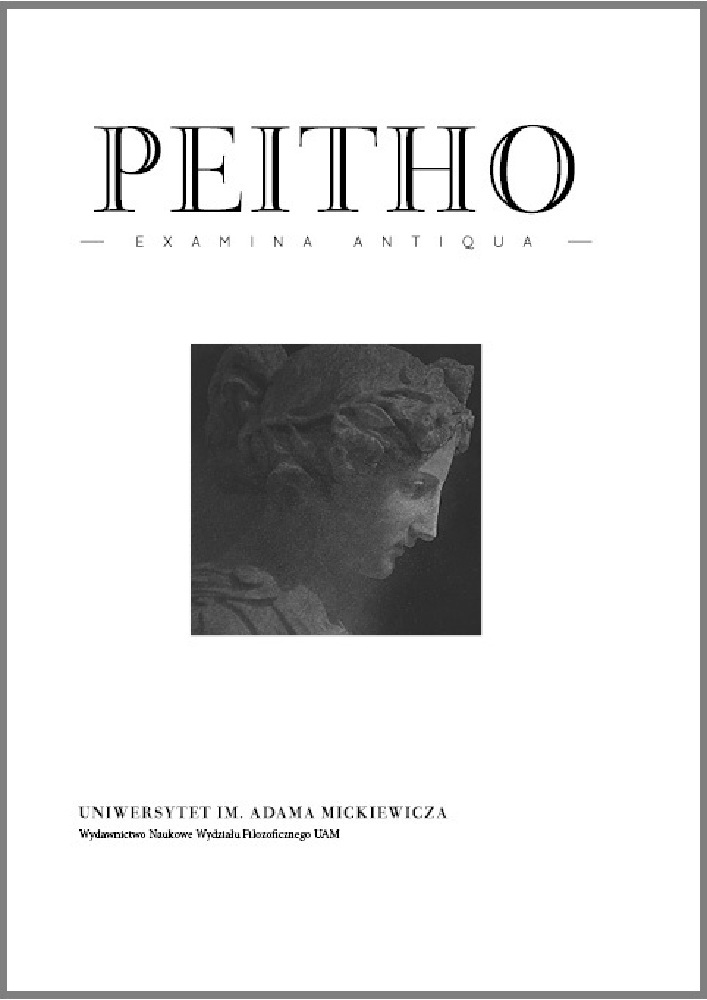Abstract
The aim of the article is to indicate that there is quite strong support in the text of the Nicomachean Ethics for the argument that its inquiry is “political” rather than “ethical” in character – the textual evidence provides reasons to challenge the traditional belief that Aristotle separated ethics from politics and started the rise of ethics as a new branch of philosophy. In addition, one can posit a hypothesis (and this has already been done) that the reader, whom Aristotle had in mind while writing what we now know as the Ethics, was a politician-lawgiver (and not just any educated Greek or – which is even less probable – any human being). So the reader aimed at in the Ethics is the same as the reader aimed at in the Politics – a politician-lawgiver. The Ethics and the Politics are a two-part but inseparable compound that together make a textbook for a politician-lawgiver. Both parts should be read together because the one cannot be understood correctly (i.e. as closely as possible to the intentions of their author) without the other. Aristotle studies human good not from the point of view of the individual but from the point of view of the human community. The highest human good – the philosopher’s eudaimonia – is achieved not by individual effort (or not fundamentally by that) but as a result of good laws and a well-organized life in a polis.
References
Bodéüs, R., 1993, The Political Dimensions of Aristotle’s Ethics, Albany.
Burnet, J., 1900, The Ethics of Aristotle. Edited with an Introduction and Notes, London.
Cooper, J.M., 2010, „Political community and the highest good”, w: J.G. Lennox, R. Bolton (ed.), Being, nature, and life in Aristotle: essays in honor of Allan Gotthelf, Cambridge, s. 212–264.
Crisp, R. (transl.), 2000, Aristotle’s Nicomachean Ethics, Cambridge.
Grant, A., 1885, The Ethics of Aristotle, London.
Gromska, D. (tłum.), 2000, Etyka nikomachejska, w: Arystoteles, Dzieła wszystkie, t. 5, Warszawa.
Hardie, W.F.R., 1989, Aristotle’s Ethical Theory, Oxford.
Irwin, T. (transl.), 1985, Aristotle. Nicomachean Ethics, Indianopolis.
Kraut, R., 2006, „Doing Without Morality: Reflections on the Meaning of DEIN in Aristotle’s Nicomachean Ethics”, Oxford Studies in Ancient Philosophy 30, s. 159–200.
Piotrowicz, L. (tłum.), 2001, Polityka, w: Arystoteles, Dzieła wszystkie, t. 6, Warszawa.
Rackham, H. (transl.), 1926, Aristotle. The Nicomachean Ethics, Cambridge MA.
Rowe, C. (transl.), 2002, Aristotle. Nicomachean Ethics, Oxford.
Schofield, M., 2006, „Aristotle’s Political Ethics”, w: R. Kraut (ed.), The Blackwell Guide to Aristotle’s Nicomachean Ethics, Oxford, s. 305–322.
Skowroński, L., 2011, „Dlaczego konieczne jest nowe polskie tłumaczenie Etyki nikomachejskiej Arystotelesa?”, Archiwum Historii Filozofii i Myśli Społecznej 56, s. 53–68.
Skowroński, L., 2014, Arystoteles o celu ludzkiego życia, Nowa Wieś Nad Drwęcą.
Wesoły, M.A., 2016, „Ethos w filozofii helleńskiej”, Ethos 114, s. 86–107.
Wróblewski, W. (tłum.), 2000, Etyka wielka, w: Arystoteles, Dzieła wszystkie, t. 5, Warszawa.
License
Peitho provides immediate open access to its content on the principle that making research freely available to the public supports a greater global exchange of knowledge.
